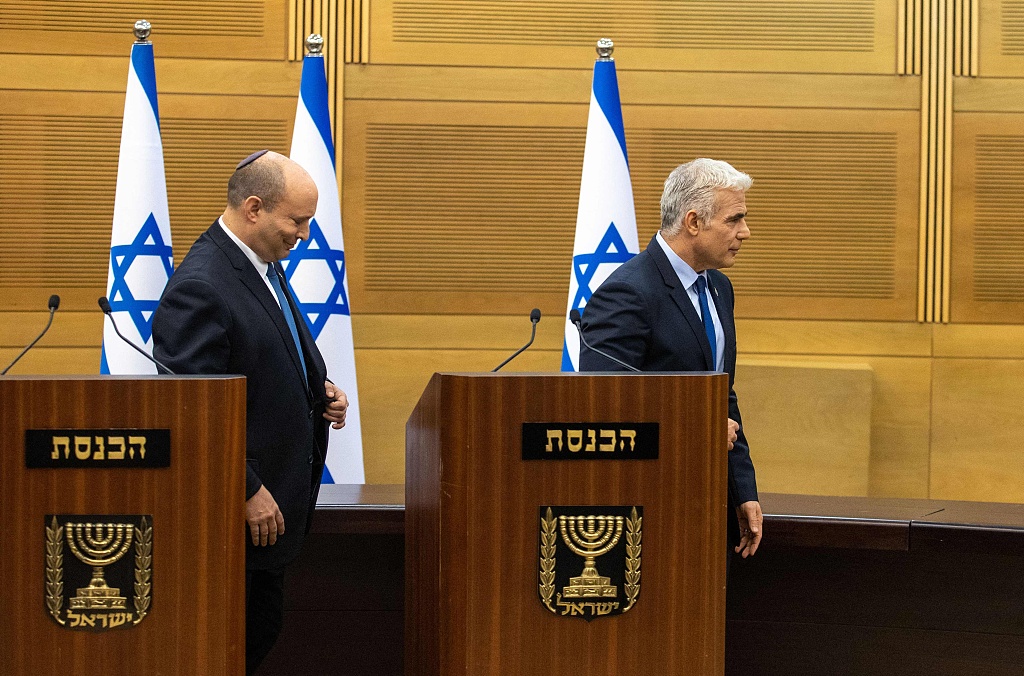The Israeli Prime Minister confirmed the collapse of the ruling Coalition, and Netanyahu called "good news."

On June 20th, 2022, in Jerusalem, Israeli Prime Minister Bennett (left) and Foreign Minister Yael Lapid (right) issued a joint statement to the media. People’s visual map
On June 20th, local time, Israeli Prime Minister Bennett and Deputy Prime Minister and Foreign Minister Lapid issued a joint statement, saying that the Israeli ruling coalition will submit a bill to dissolve the Knesset next week.
If the bill is passed, Lapid will become the caretaker prime minister until the next parliamentary election on October 25th. However, according to Israel’s Ha ‘aretz, a source said Bennett was considering quitting politics completely.
The direct reason why Bennett and Lapid made the above decision was that the law granting special legal status to Israeli settlers in the West Bank was about to expire, and the bill to extend the bill was rejected in the Knesset because of differences among various parties. Ha ‘aretz reported that Bennett had a discussion with Israeli Attorney General Ghali Miala on June 17th, arguing that it was impossible to extend the application bills of Israeli laws to settlers in the West Bank at present, but these bills would be extended automatically once the next parliamentary elections were held.
The ruling Coalition is desperate.
"It is not easy to stand in front of you today, but we have reached an understanding and made the right decision for Israel." Bennett and Lapid said in a joint television statement that they have tried every means to safeguard this diversified alliance, and it is the right decision for the country to dissolve parliament now. Lapid thanked Bennett for putting national interests above personal interests, and Bennett attacked "unprecedented politicization of parliament" in his statement.
Bennett and Lapid said that the Coalition government had "swept away the pain and paralysis of the Netanyahu era and put dignity and trust back at the center." In order to prevent former Prime Minister Benjamin Netanyahu from coming to power, Lapid and Bennett formed an alliance of eight political parties with different ideologies. However, due to the deep differences between ideology and Palestinian issues within the Coalition, and the constant withdrawal of members, the ruling Coalition finally lost its advantage and became a minority in the parliament, and the pressure was increasing.
Israeli Defense Minister Ganz was the first official to make a public response to the joint statement. He said, "The government has done a very good job, but it is a shame for the country to have to hold elections."
Attorney General Gideon Saar also responded to the joint statement. "The irresponsibility of some Coalition members has brought inevitable results." He pointed out that "the next election goal is clear: prevent Netanyahu from returning to power and let the country submit to his interests." When voting on the bill applicable to settlers in the West Bank, it was precisely because the opposition party that originally supported the bill voted against it that the bill that could have been passed was rejected.
Mansour Abbas, the leader of the Arab political party "United Arab List Party" ("Ram Party") who entered the cabinet for the first time, told Israeli News Channel 12 that he and his party "hope to have partners and influence in the new government".
Bennett and Lapid’s joint statement came only a few weeks before US President Biden’s planned visit to Israel. Previously, the Israeli government had been expecting Biden to help promote regional security relations and confront Israel’s long-term enemy Iran. If Lapid becomes the caretaker prime minister, his first topic after taking office will be to prepare for Biden’s visit. According to CNN, a White House official said that despite the political turmoil in Israel, Biden’s trip to the Middle East is expected to go ahead as scheduled.
The opposition rejoiced.
Meanwhile, Netanyahu, leader of the opposition Likud Party, posted a video on social media cheering "good news" and promised to establish a "national government to rebuild national pride". He told reporters in parliament, "We are getting rid of the worst government in the history of this country." Netanyahu also accused Bennett and Lapid of "brainwashing" and "everyone was smiling when the government was about to collapse."
Bezalel Smout, leader of the far-right Zionist party "National Alliance", wrote on social media that "Jewish unity, Zionism and true nationalism will lead Israel." The party said that it would join hands with Likud Group to establish a "completely right-wing" government and "restore street safety".
On June 19th, Likud submitted a bill to dissolve the Knesset, which was originally scheduled for a preliminary vote on June 22nd. However, with the increasing pressure of the ruling Coalition, Bennett finally decided to take the lead in stepping down before the dissolution motion of Likud Group was voted.
According to the Israel Times, on the night of the joint statement on June 20th, leaders of right-wing and religious opposition parties gathered in Netanyahu’s parliamentary office for talks. Netanyahu said that he would form a government led by Likud with other partners. He said that he is preparing for the election, but if more right-wing party members give up their "personal boycott" against him, he will not rule out the election of future government members from the current parliament.
Recent opinion polls show that the support rate of Netanyahu’s Likud party and far-right religious parties is still high, although it is still not enough to win a majority in parliament.